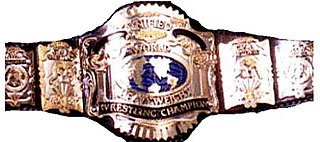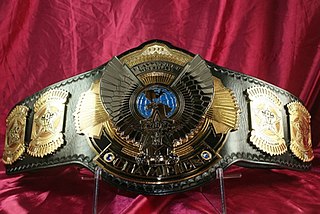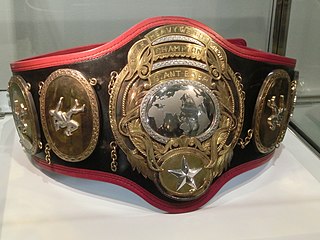
The USWA Unified World Heavyweight Championship was a professional wrestling world heavyweight championship formed in 1988, which consisted of the WCWA World Heavyweight Championship from World Class Championship Wrestling and the AWA World Heavyweight Championship from the American Wrestling Association. The title was unified on December 13, 1988, when AWA World Champion Jerry Lawler defeated WCWA World Champion Kerry Von Erich in a unification match.

The AWA World Heavyweight Championship was a professional wrestling world heavyweight championship and the highest ranked championship in the defunct American Wrestling Association (AWA). All AWA trademarks, including the AWA World Heavyweight Championship, are now owned by WWE. The championship was generally contested in professional wrestling matches, in which participants execute worked finishes rather than contend in direct competition.

The AWA World Light Heavyweight Championship was a title in the American Wrestling Association (AWA) from 1981 until it closed in 1991. In 1989, the Japan-based Frontier Martial-Arts Wrestling (FMW) promotion began billing Florida Championship Wrestling/Professional Wrestling Federation champion Jim Backlund as the AWA champion, something not acknowledged by the AWA; the title became FMW's lower weight division title. From 1988 through the closure of the AWA in 1991, there were two separate lineages, with the FMW version of the championship being sometimes referred to as the FMW World Light Heavyweight Championship. In 1992, FMW renamed the title to the WWA World Martial Arts Junior Heavyweight Championship before retiring it in 1993.

The NWA National Heavyweight Championship is a professional wrestling championship owned and promoted by the U.S.-based, National Wrestling Alliance (NWA).
The NWA Missouri Heavyweight Championship was a singles championship in the National Wrestling Alliance's St. Louis Wrestling Club and Central States Wrestling promotions in the 1970s and 1980s. It was considered a "stepping stone" to the NWA World Heavyweight Championship. A version of the Missouri Championship has been documented to exist in 1899, 1921, 1933 to 1934, 1937, 1947, 1950, and 1954 to 1955, but it was only in 1972 that a serious championship was established. Prior to the creation of the NWA the championship was not recognized outside of the region and used by regional promoters, it is even possible that competing Missouri Heavyweight Championships existed. The championship was abandoned in 1986, as the Central States promotion was being consolidated under Jim Crockett Promotions in order to counter the World Wrestling Federation's national expansion.
The GWF North American Heavyweight Championship was the major title in the Global Wrestling Federation in Texas. The title existed from 1991 until 1994, when GWF closed. The title was featured on the promotion's show that aired nationally on ESPN.
The GWF Television Championship was a secondary title in the Global Wrestling Federation in Texas. The title existed from 1991 until 1993, when it was abandoned. The title was defended on the promotion's show that aired nationally on ESPN.
The GWF Tag Team Championship was the tag team title in the Global Wrestling Federation in Texas. The title existed from 1991 until 1994, when GWF closed. The title was featured on the promotion's show that aired nationally on ESPN. It is known as the first tag team title that Harlem Heat won. In its early days, the GWF pretended on television that it was part of a larger worldwide promotion. In 1991, it was announced that a tag team known as the "English lords" had been injured in a car wreck and that the GWF was organizing a tournament to award the vacated title in Dallas. No such team as the English Lords ever existed.
The NWA World Junior Heavyweight Championship is a professional wrestling world championship in the National Wrestling Alliance (NWA). Created in 1943, the title is competed for by junior heavyweight wrestlers.

The NWA Florida Heavyweight Championship was a major title in Championship Wrestling from Florida and is now the major title in NWA Florida Wrestling Alliance. It started in 1937 and was abandoned in 1949. It was picked back up in 1966 by CWF and lasted until 1987 when the company was purchased by Jim Crockett Promotions. In 1988, the newly created Florida Championship Wrestling (FCW), soon renamed Pro Wrestling Federation (PWF), picked it back up in 1988 and it continued its lineage through NWA Florida, until they ceased operations in 2006. In 2009, Pro Wrestling Fusion revived the title until they left the NWA in 2011. For several months in 2012, a new Championship Wrestling from Florida affiliated with the NWA, briefly reviving the title until NWA Florida Underground Wrestling took over the championship.

The WCWA World Heavyweight Championship was a professional wrestling world heavyweight championship promoted by the Dallas–Fort Worth metroplex area–based World Class Wrestling Association (WCWA). The championship was originally created in June 1966 by WCWA's predecessor NWA Big Time Wrestling (BTW), billed as the local version of the NWA United States Heavyweight Championship before being renamed the NWA American Heavyweight Championship in May 1968. In 1982, Big Time Wrestling rebranded themselves as "World Class Championship Wrestling" (WCCW) and the championship was renamed the WCCW American Heavyweight Championship. In 1986 WCCW withdrew from the National Wrestling Alliance, creating the World Class Wrestling Association, replacing the WCCW American Heavyweight Championship with the WCWA Heavyweight Championship, replacing the NWA Worlds Heavyweight Championship as the top title recognized by the promotion. In 1989, the WCWA championship was unified with the AWA World Heavyweight Championship to become the USWA Unified World Heavyweight Championship as WCWA merged with the Continental Wrestling Association (CWA) to become the United States Wrestling Association. In 1990 WCWA split from the USWA, but the promotion folded without determining a WCWA World Heavyweight Champion. As it is a professional wrestling championship, the WCWA World Heavyweight Championship was not won by actual competition, but by a scripted ending to a match.

The NWA Texas Heavyweight Championship is a professional wrestling title that has existed since the 1930s. Though its exact date of creation isn't known, it is among the oldest championships used in professional wrestling today. The title has used a variety of different names over the years, which consists of initial changes to represent the various companies that have controlled the title at different times. Originally, it was simply known as the Texas Heavyweight Championship until its name was changed after the formation of the National Wrestling Alliance in 1948. For most of the title's existence, at least until the early 1990s, it was defended almost exclusively within the Dallas, Fort Worth, Houston and San Antonio areas of Texas. From the 1930s to the mid-1960s, these cities and the surrounding towns were within the territory operated by Ed McLemore, which was known simply as Southwest Sports, Inc. at the time. After McLemore's death, the territory came under the control of Fritz Von Erich and was renamed as Big Time Wrestling. However, the promotion would be renamed World Class Championship Wrestling in the early 1980s, which is the name the territory is best remembered under today. The championship remained an NWA affiliated title until February 1986.

The AWA Southern Heavyweight Championship was a major professional wrestling title in the Continental Wrestling Association during the 1970s and 1980s. The title is part of a long lineage that was started when the NWA Southern Junior Heavyweight Championship, in use since 1939, was renamed the NWA Southern Heavyweight Championship (Memphis version) in 1974. The title's name changed again in 1978, when it was renamed the AWA Southern Heavyweight Championship due to a partnership with the American Wrestling Association. It was also called the Mid-Southern Heavyweight Championship in Pro Wrestling Illustrated and its sister publications, in order for this title to not be confused with Championship Wrestling from Florida's version of the title.

The OVW Heavyweight Championship is a professional wrestling heavyweight championship owned by the Ohio Valley Wrestling (OVW) promotion. The original championship was designed and created in 1997 by Reggie Parks. The title was introduced on August 17, 1997, at an OVW live event, then known as the NWA-OVW Heavyweight Championship due to OVW's relationship with the National Wrestling Alliance (NWA) governing body. OVW eventually parted ways with the NWA in October 2001, and the title was renamed the OVW Heavyweight Championship. OVW later became a developmental territory for the World Wrestling Entertainment organization, but their partnership eventually ceased on February 7, 2008. The title has no known weight-limit, even though it is a heavyweight championship. The title has also went through almost 3 different versions in its current twenty-four year run. With The first being made by Reggie Parks in 1997, which was then retired and vacated in early 2012. The second version would then be made by Reggie Parks and Dave Millican for OVW. The current version however was designed and created by Top Rope Belts, and ended up being used from 2012 to the present day.

The USWA World Tag Team Championship was the primary professional wrestling tag team championship promoted by the Memphis, Tennessee-based United States Wrestling Association (USWA). The Continental Wrestling Association and World Class Wrestling Association (WCWA) merged in 1989 to form the USWA. In the merger the USWA replaced both the WCWA World Tag Team Championship and the CWA Tag Team Championship with the USWA version. The promotion awarded Cactus Jack and Scott Braddock the championship after they won the WCWA championship on August 4, 1989. The USWA closed in 1997, with PG-13 as the final champions. There were a total of 116 reigns in the eight year lifetime of the championship.

The Pacific Wrestling Federation (PWF) World Heavyweight Championship is a professional wrestling world heavyweight championship and one of the three titles that make up the Triple Crown Heavyweight Championship. It was created in 1973 by All Japan owner Giant Baba, after he won a series of ten matches against Bruno Sammartino, Terry Funk, Abdullah the Butcher, The Destroyer, Wilbur Snyder, Don Leo Jonathan, Pat O'Connor and Bobo Brazil.

The AWA Southern Tag Team Championship was a professional wrestling tag team title in the Tennessee area from the 1940s through the late 1980s. It was originally named the NWA Southern Tag Team Championship (Mid-America version) from its inception through 1977, when it was renamed the AWA Southern Tag Team Championship due to a partnership with the American Wrestling Association. The title existed until 1988 when it was replaced with the Continental Wrestling Association Tag Team Championship.
The CWA/AWA International Tag Team Championship was a professional wrestling tag team title defended in the Continental Wrestling Association. It was created in 1985 from the CWA's partnership with the American Wrestling Association. The title was abandoned in 1987 when the CWA was renamed the Championship Wrestling Association, and the original Continental titles were abandoned or unified with others.
The PWA Light Heavyweight Championship was a professional wrestling light heavyweight championship in Pro Wrestling America (PWA). It remained active until 1992 when the title was abandoned.
The NWA Mississippi Heavyweight Championship was a professional wrestling regional championship in Gulf Coast Championship Wrestling (GCCW). It was a secondary title, complementing the NWA Gulf Coast Heavyweight Championship, and one of several state championships recognized by the National Wrestling Alliance. The title was deactivated with the retirement of "Cowboy" Bob Kelly on September 3, 1976.












